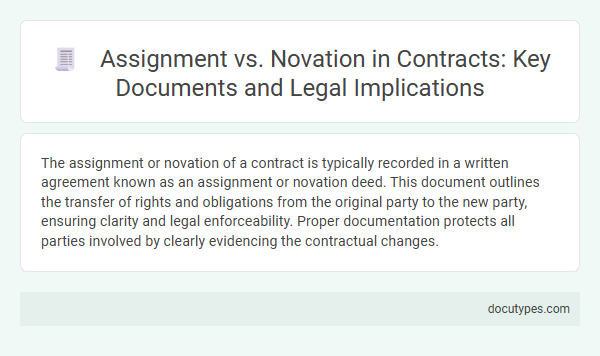The assignment or novation of a contract is typically recorded in a written agreement known as an assignment or novation deed. This document outlines the transfer of rights and obligations from the original party to the new party, ensuring clarity and legal enforceability. Proper documentation protects all parties involved by clearly evidencing the contractual changes.
Introduction to Assignment and Novation in Contracts
Which document records the assignment or novation of a contract? The assignment or novation of a contract is typically recorded through a formal written agreement specifically titled as an "Assignment Agreement" or a "Novation Agreement." These documents ensure the legal transfer of rights and obligations between the original and new parties involved in the contract.
Defining Assignment: Purpose and Process
The document that records the assignment or novation of a contract is typically called an Assignment Agreement or Novation Agreement. These legal documents formalize the transfer of rights and obligations from one party to another.
Assignment involves transferring benefits or rights under a contract without changing the original party's obligations. This process requires clear documentation to ensure all parties acknowledge the shift in entitlements and responsibilities.
Defining Novation: Legal Framework and Procedure
The document that records the assignment or novation of a contract is typically a formal agreement specifically drafted to reflect the transfer of rights and obligations. Novation involves replacing an original party with a new party, releasing the original party from all contractual obligations under the contract.
- Novation Agreement - A legal document executed by all parties involved to substitute one party with another, creating a new contract.
- Legal Framework - Governed by contract law principles, novation requires the consent of all original and incoming parties to be valid and enforceable.
- Procedure - The process involves drafting, reviewing, and signing the novation agreement to formally transfer contractual rights and liabilities.
Your rights and responsibilities under the original contract are extinguished upon successful novation, ensuring clarity and legal certainty in the contractual relationship.
Key Differences Between Assignment and Novation
The document that records the assignment or novation of a contract is crucial for legal clarity and enforceability. Understanding the key differences between assignment and novation helps You manage contractual obligations effectively.
- Assignment Agreement - This document transfers benefits or rights under the original contract to a third party without changing the obligations of the original parties.
- Novation Agreement - This document replaces the original contract with a new one, transferring all rights and obligations to a new party and extinguishing the original contract.
- Legal Effect - Assignment allows the original party to remain liable, while novation releases the original party from liability, fully substituting the new party.
Essential Documents Required for Assignment
The primary document that records the assignment or novation of a contract is the Assignment Agreement or Novation Agreement. These documents clearly detail the transfer of rights and obligations from one party to another, ensuring legal enforceability. You must ensure these agreements include all essential terms such as consent from all involved parties, description of the original contract, and the effective date of the transfer.
Essential Documents Required for Novation
The document that records the assignment or novation of a contract is typically the Assignment Agreement or Novation Agreement. These legal instruments formally transfer rights and obligations from one party to another, ensuring clarity and enforceability.
Essential documents required for novation include the original contract, the Novation Agreement, and any necessary consent letters from involved parties. The Novation Agreement must clearly state the release of the original party and the acceptance of the new party. Your careful review and execution of these documents are crucial to validate the contract transfer legally.
Legal Implications of Assignment in Contracts
The document that records the assignment or novation of a contract is typically called an Assignment Agreement or a Novation Agreement. These agreements legally transfer rights and obligations from one party to another, ensuring all involved parties consent to the changes. Understanding the legal implications of assignment in contracts is crucial because it affects your responsibilities and the enforceability of the contract terms.
Legal Implications of Novation in Contracts
| Document Type | Deed of Novation |
|---|---|
| Purpose | Records the transfer of contractual rights and obligations from one party to another, replacing the original party with a new one |
| Legal Implications of Novation |
|
| Difference from Assignment |
|
Common Use Cases: When to Assign vs. Novate
The document that records the assignment or novation of a contract is crucial for maintaining clear legal obligations between parties. An assignment involves transferring rights or benefits from one party to another without altering the original contract terms.
Novation replaces an original party with a new party, creating a new contract and releasing the original party from liabilities. You must understand when to assign versus when to novate, depending on whether you want to transfer benefits only or transfer both rights and obligations.
Which Document Records Assignment or Novation of a Contract? Infographic

